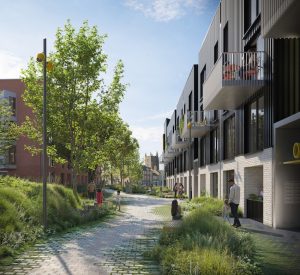Construction workloads boosted by infrastructure surge

Workloads across the Midlands construction sector saw a further rise in the second quarter, mainly due to a surge in infrastructure works across the region.
According to the latest the RICS Construction Market Survey, the region is bucking the UK trend of easing sentiment.
Forty-six per cent more respondents reported a rise in infrastructure, “far surpassing” sentiment in other areas of the UK. This may have received some support from the fiscal commitments outlined in the Autumn Statement with developments in roads seeing the strongest pace of growth, RICS said.
Private housing continued to strengthen with 45% more respondents reporting a rise this quarter, up from a net balance of 36% in Q1, the strongest reading in nearly two years. Expectations for the next 12 months remain generally positive, although respondents appear less optimistic on their employment prospects.
While all sub-sectors remained in positive territory this quarter, private commercial and private industrial eased slightly with 31% and 28%, respectively, reporting a rise in workloads, down from 44% and 33% in Q1.
The more uncertain outlook for the economy has led to a less optimistic outlook for the sector over the year ahead; 49% more contributors expect activity to rise rather than fall. This is down from 61% the previous quarter. Likewise, 35% more contributors now expect to see employment rise rather than fall, compared to the 39% average reading in 2016.
With regards to employment, the ever-prominent skills crisis continues to hamper growth with quantity surveyors and bricklayers presenting the greatest hiring challenge throughout the region.
Financial constraints and planning delays are reported, once again, as being the most significant impediment to activity in the Midlands, and with a net balance of 79% and 60%, respectively, are at the upper end of readings in the past four years. Economic uncertainty driven largely by Brexit and the recent election result have been identified as the primary cause of the former.
Jeffrey Matsu, senior economist, commented on the latest RICS survey data.
He said: “Economic and political uncertainty appear to be weighing on sentiment, but all things considered, current conditions and year-ahead workload expectations are holding up rather well relative to the longer-term trend. Given the ongoing nature of Brexit negotiations, it remains to be seen what impact this will have on financial conditions or the availability of skilled labour to the industry.”
Lee Jones of Quantem Consulting in Birmingham said: “Post-Brexit concerns regarding security ahead and it is taking a long time for the funds or clients to process decisions to proceed at various stages. However, this uncertainty may also work positively and provide opportunities for various clients.”
Mark Deakin of Turner & Townsend in Nottingham said: “The East Midlands is dominated by smaller publicly-funded and procured workloads. The sector competition remains fierce; however, the workload is there to sustain a sound business. We must maintain a strong positive outlook post-Brexit.”









